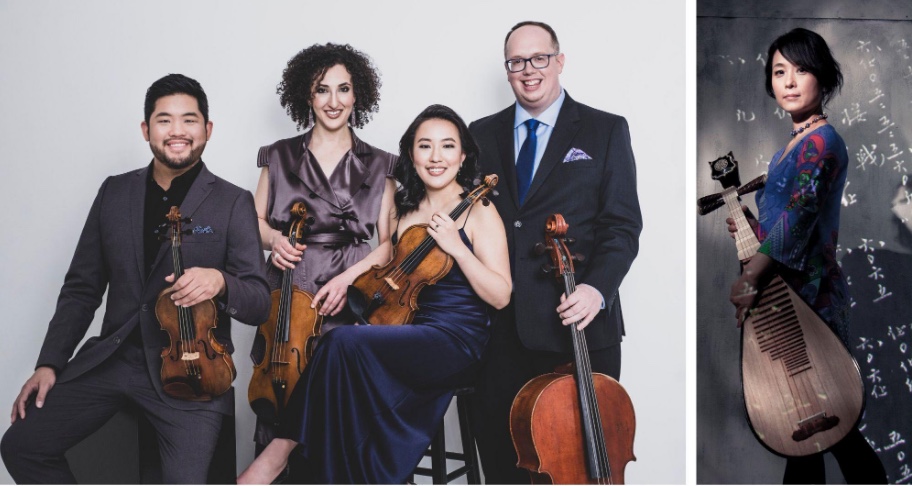by Mike Telin

On February 25 in Oberlin Conservatory’s Warner Concert Hall, the world’s premiere pipa virtuoso joined the Verona Quartet — Jonathan and Dorothy Ro (violins), Abigail Rojansky (viola), and Jonathan Dormand (cello) — for a program that traveled the musical globe to explore the question, What is home? The concert was presented as part of the Oberlin Artist Recital Series.
Throughout the evening, the large audience was treated to a musical collaboration that never felt forced. As always, Wu Man’s innate sense of musicality proved that great virtuosity is not always about fast technical passages, it can also be found in the nuances of serenity. And the Verona, Oberlin’s Quartet-in-Residence, were unified partners, producing musically intelligent and technically flawless playing that seamlessly moved in and out of a spectrum of colors and stylistic emotions.
These qualities were evident during the intimate performance of Harry T. Burleigh’s Goin’ Home, which opened the program. Based on the “Largo” from Dvořák’s New World Symphony with Wu Man taking charge of the famous melody, the work took on an old wine in new bottles feeling.
That feeling continued during two selections from John Dowland’s Lachrimae, or Seaven Tears. Here the pipa was integrated into the fabric of the quartet. The somber “Lachrima antiquae” (old tears) was simply beautiful, and “The Earl of Essex,” a lively Galliard, was exquisitely played.
The Verona took center stage for two works inspired by ethnic communities on opposite sides of the globe. Wu Man arranged Glimpses of Muqam Chebiyat, a traditional piece from Western China for the Kronos Quartet’s “50 for the Future” project. During “Muqaddima” each Quartet member was given the opportunity to show off skillful improvisations.“Third Dastan” is a exuberant, jazzy dance, that grabbed your attention. The Quartet reveled in Wynton Marsalis’ “Creole Contra danzas” from At the Octoroon Balls: String Quartet No. 1. The music and the performance beautifully captured the Creole influences of the Crescent City.
Wu Man rejoined her collaborators for two movements from Georgian (the country not the state) composer Sulkhan Tsintsadze’s Miniatures (for String Quartet and Pipa). While “Song” was perfectly pleasant, “Sachidao,”which begins with the Pipa improvising over viola and cello drones before transitioning into a fast dance, was imbued with colorful harmonies.
The players then launched into Boccherini’s “Introduction and Fandango” from the Guitar Quintet No. 4, a rousing performance of the Spanish folk dance. Dormond deserves a shout out for his ear-catching cello slides and superb castanet playing.
After a long intermission, Wu Man gave a heartfelt interpretation of her own arrangement of the traditional Flute and Drum Music at Sunset.
Introducing Zhao Lin’s Red Lantern, Quintet for Pipa and String Quartet from Zhao Jiping’s film Raise the Red Lantern, Wu Man told the audience that the composer is the John Williams of China. While a video took us on a tour of a family compound, the work’s five movements offered little insight into what we were seeing on screen or vice-versa. Still the serene score provided a meditative mood to contemplate the question, What is home?
Published on ClevelandClassical.com March 10, 2023.
Click here for a printable copy of this articleHere



